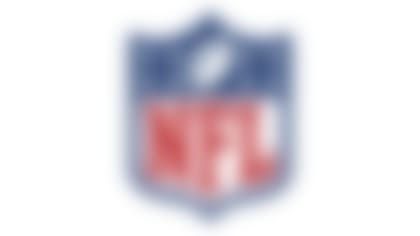NEW YORK -- The NFL announced the largest donation in its history on Wednesday -- $30 million to the National Institutes to Health. The funding is to be used at the discretion of NIH, which is part of the U.S. Department of Health and Human Services.
This act of generosity was not generated in a vacuum. Last week, the league announced a partnership with the U.S. Army in pursuit of a similar core goal -- gaining a greater knowledge of the brain injuries that affect players and soldiers. Around the same time, the league filed a motion to dismiss a lawsuit seeking damages for 3,400 ex-players and family members who assert the league has been negligent in dealing with concussions.
The latest initiative has earmarked money not just to help football players, but athletes across all sports, and will help establish the new Sports and Health Research Program within the NIH. On the eve of the landmark move, Commissioner Roger Goodell sat down to speak with NFL.com.
Albert Breer:Roger, $30 million, the largest contribution in the history of the league to anything: How did this all come up?
Roger Goodell: Well, it is part of our continuing effort to try to pioneer research that is going to improve the safety of our players and well beyond our players -- in other sports and even beyond sports. We wanted to find the answers that we think are so important for either head injuries or long-term cognitive care. We want to make sure we are doing everything possible to get the best research. And NIH obviously is a leading institution that will pioneer that research, determine where the money is spent, help us find those answers, and make sure that it is available for everybody, just like we have done with all of our research.
AB:I know NIH isn't the only group that works on these things, I know there's a prominent one at Boston University as well. Why NIH, and why do you trust in them enough to allow them to determine how the money is dispersed?
RG: NIH will work with people like the Boston (University) group. We will make sure that they see the different proposals, and they can make the determination as to what's the right science, what's the best science. The important thing is to do this with the right science. And that's why NIH sets that standard.
AB:They're going to establish something called the Sports Health and Research Program. Can you explain specifically what that's going to be?
RG: Well, again, to focus in on these funds and hopefully other funds that would be designed to pioneer that research and find new ways of making our games safer, whether it be football or other sports. So concussions that can happen in football may also happen in other sports. We want to make sure we can do whatever is necessary for people to contribute to finding solutions.
AB:Why make this a broad-based program that's not just football?
RG: Because we believe we're leaders. And as leaders, we have to make a difference, not just in football and not just in the NFL, but at all levels of football and in other sports. And we believe even beyond that into the military. We think what research we do we will share with everybody so that we can make everything safer, including our military.
AB:This comes one week after you made the announcement on the Army partnership. How does one tie into the other and why now?
RG: We have been working on this for well more than six months. We've been in conversations with the Players Association. We've been in conversations with the National Institutes of Health. And it takes a while to bring these kinds of programs together. And we were fortunate to be able to get this done and we wanted to announce it and get right to work and put that money to work funding research.
AB:You mentioned the Players Association. What's their involvement in this?
RG: We hope that the involvement is going to be extensive. As you know, we committed to $100 million in the collective bargaining agreement. We've had extensive discussions at the NIH with the Players Association. They've had separate meetings. We've had discussions as recently as this summer. We all want to try to do what's right to try to make our game safer and other sports safer. And this is part of our ongoing effort.
AB:The 32 owners are under a tremendous amount of legal liability right now with the concussion lawsuit. What role do the lawsuits play in all this?
RG: Absolutely nothing. We've been working on this for a long time. We've funded research going back into the '90s, well before any of that litigation. This is being done to continue our efforts to pioneer that research, make our game safer and make other games safer.
AB:Is this in any way an acknowledgement that football can be a life-shortening or life-threatening game?
RG: No, in fact the studies show exactly the opposite. Just because you play football, and in the NFL, statistics will show you that you actually live a longer life than the average male citizen that didn't play football. Again, those are averages. You've got to look at that. The reality of it is we have to do everything we can to make our game safer and that is what this is.
AB:I know you mentioned some of the public service announcements you've done, you highlighted how you played football growing up. Do you think it's a more dangerous game now than when you were a child?
RG: No, in fact I had my concussion in high school sports in baseball. The reality is in sports, particularly where there is contact, you're going to have injuries. And what we want to do is understand those injuries, do what we can to prevent those injuries and make sure that we manage them properly when they do occur. And what we're trying to do here in football -- not only with equipment but with rules and also this research -- should make all of sports more successful and safer.
AB:Based on the information you have -- and I know this is a tricky concept, because you don't have sons -- but if you had a son today, in 2012, would you let him play football?
RG: Sure I would. You know, I had my daughters active in sports. And I think it's one of the key issues that I asked the leadership at West Point last week: How important are athletics to building leadership going forward? And they were very strong. It is fundamental to building leadership -- the competition, the ability to develop teamwork and trying to accomplish an overall goal as opposed to an individual goal, to be resilient and to overcome challenges. All of those things are what leadership's all about and developing leaders. And I think sports play a very, very important role in that, but those of us in leadership positions still have to do everything we can to continue to make our games safer.
AB:I'm sure you run into parents who ask about your game specifically and about letting their children play your game. Do you think it's understandable that they'd be concerned about letting their kids play football?
RG: Sure, and that's why we're out making sure the parents understand. We're out educating, making them aware of concussions. We had a group of 45 moms who were in here a couple of weeks ago, educating them on what we're doing and how to make the game safer, working with USA Football to make sure they bring parents into the discussion and understand how to play the game safely, how to wear your equipment properly, and what to do if there is an injury. (It's) also why we've been out trying to work on this Zackery Lystedt Law, which is now passed in 39 states plus the District of Columbia, which is bringing greater awareness to the fact that in any sport your child needs to be educated and the people involved and supervising your children need to be educated in concussions. When it occurs, you take them out of the game; and they don't return until they have been properly approved by medical personnel. Those are important steps for all of sports.
AB:Education is one thing. Putting it in action is something completely different. When you turn on the TV and you see people talking about football being at a crossroads, and you see stories about kids being paralyzed, what do you think?
RG: Well, I think NFL football has been at a crossroads for well over 100 years. Before our existence even, in college football back to 1905 when President (Theodore) Roosevelt got involved. We can make the game safer and make sure that our game stays exciting. We think we've done that. Our game is safer, and it is more exciting.
AB:Taking it to the professional level, Junior Seau's brain is going out to NIH, Dave Duerson's situation was similar -- a suicide. How much does that weigh on your conscience, what's happened to some of your ex-players?
RG: You never want to see that type of thing happen. Those are tragic things for those individuals and their families. That's something you always take seriously. We want answers, but we're not going to wait for all of those answers to make the changes that we think are important, and not just in our game but in all of sports and to try to make the equipment safer and do what we can with the rules. Those are changes that we can control now until science catches up and can answer some of those questions.
AB:Do you think football is responsible for those types of things?
RG: Those are things that the scientists, again, they'll have to make those decisions at some point in time. But I think there's a lot of science that still needs to be done, because one thing we've determined and been able to work with medical professionals on, there's a lot of unknowns when it comes to brain injuries.
AB:I asked you about the endgame last week …
RG: Endgame of what?
AB:The endgame of the Army program, where you guys are going next. ... Where would say you guys are in that process, with the education, the implementation of new rules, all that stuff?
RG: Well, there's a lot more work to be done, is the bottom line. There's a much greater awareness about head injuries and concussions and the importance of treating them conservatively and cautiously. And I think that's been great for all of sports, and beyond sports as we talked about. What we want to continue to do is be a part of that solution. And we expect that this is a shared responsibility that we all have to do more.












